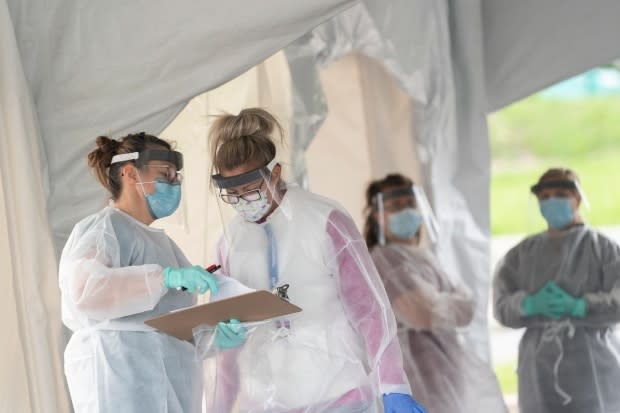Montreal urges more co-operation with public health officials as COVID-19 cases surge

Montreal public health officials are trying to contain more than 50 active outbreaks of COVID-19 on the island, including 14 outbreaks at schools.
Dr. Mylène Drouin, public health director for Montreal, said Monday the city has seen a sharp increase in reported cases in recent days, overwhelming its capacity to trace the source of infections.
She said that means everyone must do more to keep their contacts at a minimum.
"The work public health is doing of tracing and isolating contacts and cases will not be sufficient at this time," Drouin said at a news conference.
Drouin said many experts now say the province has entered the second wave of the virus, and Montrealers should focus on keeping that wave as small as possible.
Along with the 14 outbreaks at schools, public health officials are dealing with outbreaks in 28 workplaces, six in long-term care facilities and two in daycares.
"Most of our outbreaks are under control and most of them are small. This tells us that those people do conform to public health recommendations and are in control at this level," Drouin said.
As for schools, Drouin said most in Montreal had held off on starting extracurricular activities after communicating with health authorities.
She specified that of the 14 outbreaks in schools, 12 were outbreaks of fewer than 10 people.
More than 50 per cent of the city's cases are currently among young adults, between the ages of 18 and 34.
While younger people often experience less severe symptoms, Drouin said that isn't a reason to slack off on guidelines.
"We know they have a less severe form of the illness but those youth are workers. They're the ones who bring the virus in a workplace, in elder homes, schools or daycares," Drouin said.
Drouin said most cases are still coming from private gatherings.
"We had some large outbreaks at weddings, baptisms and parties," she said.

Montreal, along with Quebec City and the Chaudière-Appalaches region, is now considered an orange area under Quebec's colour-coded regional alert system.
Private gatherings have been limited to a maximum six people, and bars and restaurants have been ordered to stop serving alcohol at 11 p.m.
Montreal Mayor Valérie Plante echoed Drouin's calls for caution Monday.
"We do want to see our friends and family but definitely we are in the second wave and we want to limit the damage," said Plante.
Drouin urged those who test positive for COVID-19 to co-operate with public health authorities as they try to trace their contacts.
The city saw major issues with contact tracing on the weekend when, out of the 500 people they called, only one third picked up.
Testing ramped up
In an attempt to curb the spread of the novel coronavirus, the city's regional health authorities have teamed up to create one central testing body to ensure testing goals and strategies are being met, Sonia Bélanger, managing director of the CIUSSS du Centre-Sud-de-l'Île-de-Montréal announced.
"All institutions of Montreal are ready for the change of level of alert. Our teams are mobilized and at this time we have enough equipment to do more than 5,000 tests per day," said Bélanger.
While the number of patients in hospitals and in intensive care units has also seen a smaller increase in recent days, Drouin said those numbers are still categorized under the "early warning" or "yellow" alert.
The city is also targeting specific areas that have seen more cases, including Villeray–Saint-Michel–Parc-Extension, Côte Saint-Luc and downtown Montreal, by setting up additional mobile testing sites.
Drouin reminded those getting tested that they are obliged to follow up with public health authorities when they test positive for COVID-19.
The city saw major issues with contact tracing last week-end when, out of the 500 people they called, only one third picked up.


